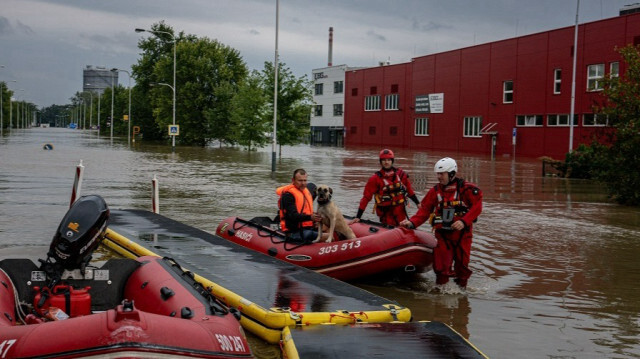
Thousands of people evacuated from their homes amid floods, caused by deadly Storm Boris
The death toll from floods has risen to 20 in four countries as deadly torrential storms hit central Europe, forcing evacuation of thousands of homes.
Severe floods continue to claim lives on Tuesday as parts of Eastern and Central Europe are grappling with Storm Boris.
So far, tens of thousands of people have been evacuated from their homes across a swathe of Austria, the Czech Republic, Hungary, Romania, and Slovakia, while the toll has reportedly risen to 20 -- seven in Romania, five each in Poland and Austria, and three in the Czech Republic.
The Polish government on Monday declared a state of natural disaster in regions of southern and southwestern Poland as the country is battling high waters that flooded towns and villages, and damaged homes and infrastructure.
Polish Prime Minister Donald Tusk announced that some €234 million ($260 million) would be allocated in an extraordinary provision to help localities and people affected by floods in southern.
Separately, local authorities in the southwestern Polish city of Nysa on Monday issued an evacuation order for all 44,000 residents.
Towns in northern Moravia, in the east of the Czech Republic remain without power on Tuesday, according to Czech Radio.
Flood alerts have reduced in the country, with around 160 locations under flood warnings as of Tuesday morning, 20 fewer than at midnight.
According to the report, large parts of the country, including Moravia and Silesia, are still suffering from severe flooding, which has claimed three lives and left seven others missing.
Czech Prime Minister Petr Fiala announced that since Friday, over 5,500 professional and voluntary firefighters, police officers, rescue teams, and volunteers have helped evacuate more than 13,500 people.
In Romania, where seven people have been killed, the government announced €20 million to help those affected by floods as the eastern part of the country is still recovering after a couple of days of severe rainfall.
More than 2,200 homes still remain without electricity in the flood-stricken region, reported Romania Insider, citing Energy Minister Sebastian Burduja.
Five people have been killed in Austria so far as the storm caused major flooding in Sankt Polten, the capital and largest city of the State of Lower Austria.
After hitting Austria, the Czech Republic, Poland, and Romania, flooding could affect Slovakia and Hungary next as a result of a low-pressure system from northern Italy that has been dumping record rainfall in the region.
Croatia is also preparing for potentially dangerously high river levels because of heavy rainfall across the region as the country's meteorological and hydrological service warns that the Danube could experience an "extremely rare" water increase.
The International Federation of Red Cross and Red Crescent Societies' head of health, disaster, climate, and crisis for the Europe region said Tuesday that Europe has been warming at a “much higher rate” than the rest of the world for decades.
Andreas von Weissenberg explained in a UN briefing in Geneva that “warm air holds more moisture, and what goes up will come down, and we see these extreme rain events.”
“We'll see more of this as we go forward,” he warned.
He stressed that the floods, now being described as "historic," would be frequent.
“These have been branded now as historic floods, and that's correct. Nothing to disagree with there,” he said. “But climate change has a way of moving the goalposts, so soon we will be talking about these kind of events as frequent or even annual as we go forward.”

